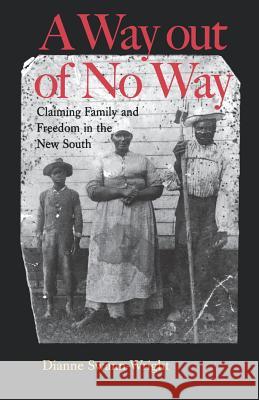A Way Out of No Way: Claiming Family and Freedom in the New South » książka
A Way Out of No Way: Claiming Family and Freedom in the New South
ISBN-13: 9780813921372 / Angielski / Miękka / 2002 / 192 str.
A Way Out of No Way: Claiming Family and Freedom in the New South
ISBN-13: 9780813921372 / Angielski / Miękka / 2002 / 192 str.
(netto: 92,67 VAT: 5%)
Najniższa cena z 30 dni: 96,51
ok. 30 dni roboczych.
Darmowa dostawa!
An African American folk saying declares, -Our God can make a way out of no way.... He can do anything but fail.- When Dianne Swann-Wright set out to capture and relate the history of her ancestors--African Americans in central Virginia after the Civil War--she had to find that way, just as her people had done in creating a new life after emancipation. In order to tell their story, she could not rely solely on documents from the plantation where her forebears had lived. Unlike the register of babies born, marriages made, or lives lost that white families' Bibles contained, ledgers recorded Swann-Wright's ancestors, as commodities. Thus Swann-Wright took another route, setting out to gather spoken words--stories, anecdotes, and sayings. What results is a strikingly rich and textured history of a slave community.Looking at relations between plantation owners and their slaves and the succeeding generations of both, A Way out of No Way explores what it meant for the master-slave relation to change to one of employer and employee and how patronage, work relationships, and land acquisition evolved as the people of Piedmont Virginia entered the twentieth century. Swann-Wright illustrates how two white landowners, one of whom had headed a plantation before the Civil War, learned to compensate freed persons for their labor. All the more fascinating is her study of how the emancipated learned to be free--of how they found their way out of no way.











